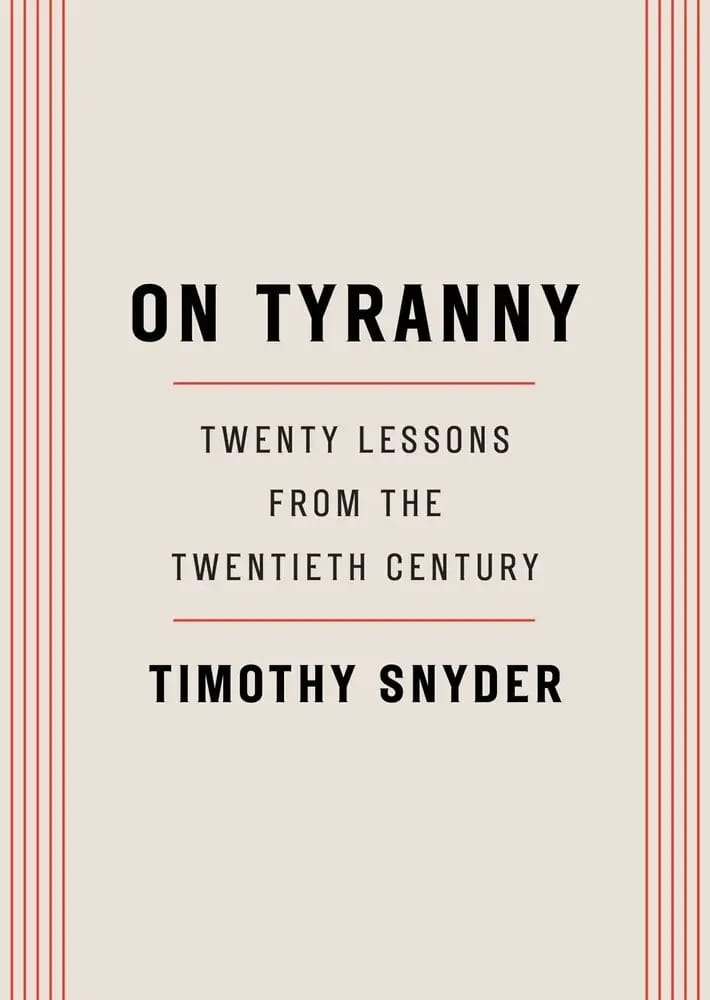If you love this newsletter and want to support the work that supports you, or let me know this work matters, please consider upgrading today!
The Easiest People to Control
The greatest threat to democracy is not force, but blindness.
The Greatest Danger Isn’t Out There
Many of us grew up believing the greatest threat to democracy was an outside enemy or nuclear disaster.
(Who hid under their desk in the Duck and Cover classroom drills that lasted into the 80s?)

But that isn’t true—not entirely.
The greatest danger lies in our shared psychological blind spots—our inability to see the predictable ways we’re persuaded to act against our own interests. We fear foreign enemies when the more insidious danger is coming from inside the house.
We live in a world where our political leaders create danger that doesn’t exist, convinces citizens they’re under threat, and offer them ways out that only work against their own interests and well-being.
They know what many of us don’t—basic psychology. Yet, access to this knowledge isn’t limited to those in power.
It’s available for everyone.
Freedom isn’t something we possess—it’s something we continually create and defend.
As Timothy Snyder writes in On Freedom, we often mistake liberty to mean having no one tell us what to do. But real freedom is something we sustain together—through truth, solidarity, and keeping the future open to possibilities we can’t yet imagine. When we forget this, we become easy prey for those who seem to speak our language but in reality are quietly narrowing the space of what we can think, say, and do.
How Dangerous Leaders Work
The traits of dangerous leaders are well-documented. The “Dark Triad”—psychopathy, narcissism, and Machiavellianism—appears often, alongside paranoia and moral emptiness, and their tactics are textbook.
What’s missing is our ability to see them—especially when wrapped in familiar language, appealing promises, or tribal identities.
In her book, Did That Just Happen? Julia Galef calls this the difference between a “soldier mindset” and a “scout mindset.” Soldiers defend their beliefs as if identity depends on them; scouts seek accurate maps of reality, even if that means redrawing the borders.
A society locked in soldier mindset will mistake manipulation for leadership if it confirms its cherished narratives.
The Needs They Exploit
Everyone is vulnerable to these forces. Recognizing and accepting that is the first step toward resisting them.
Manipulators target universal needs: belonging, understanding, having a voice. They may frame these human traits as weaknesses—or exploit the fear that these traits make us vulnerable—then use them as tools to control us.
MANIPULATION TACTICS
In politics, a manipulative leader might target the universal need to belong this way:
They promise to “give the country back to real citizens,” appealing to the human need for belonging. Then, they frame outsiders as threats and loyalty to them as the only way to remain in the “true” group, making people dependent on their approval.
In Marketing, Influencers Target the Universal Need for Understanding
A wellness influencer tells you that you’ve been “misunderstood and ignored” by mainstream medicine. They validate your need to feel seen but frame it as evidence that you’re being failed—then sell you an overpriced supplement as the solution.
In Personal Relationships, A Partner Might Prey on Shyness
At first, a controlling partner urges you to “speak your truth,” framing your self-expression as a strength. Later, they mock or belittle your opinions, casting them as naive or oversensitive—until you start self-censoring to avoid conflict, handing them quiet control over your voice.
We often believe what we’re told because we don’t know how to read the subtext, recognize the cues, or detect defense mechanisms.
Take, for instance, a recent New York Times opinion piece about a “Trad Wife” influencer who declared herself a proud anti-feminist, posting curated images of her easy, breezy, beautiful life—her post-pregnancy body, and how quickly it “bounced back.”
When, behind the scenes, she was miserable.
We can’t see that misery directly, but with sharper skills at reading between the lines, we might ask: what drives someone to promote, with such fervor, a life that harms them?
Psychologically, this can be a form of cognitive dissonance reduction. Cognitive Dissonance is the discomfort of holding two conflicting ideas, beliefs or behaviors, and it creates problems in living.
Cognitive Dissonance Reduction, is the attempt to alleviate the suffering of this cognitive dissonance. Often, it manifests as an unconscious drive to double down on a belief or lifestyle precisely because reality contradicts it. By force-feeding that image to the public, she’s not only persuading others; she’s working to persuade herself.
It can also be an act of identity defense: when a chosen identity is fragile or under threat, people often exaggerate its display (what social psychologists call reactive identity affirmation). And when underlying dissatisfaction feels shameful or dangerous to admit, it can lead to reaction formation—expressing the opposite of one’s true feelings as a way to keep those feelings hidden, even from oneself.
In this light, her relentless promotion of an idealized domestic life isn’t just about influencing others. It’s a form of self-preservation—a public performance designed to make an internal contradiction feel less unbearable.
And once you know how to spot that kind of overcompensation, you start to see it everywhere: in corporate leaders who oversell their integrity, in politicians who proclaim family values while destroying families, in anyone whose loudest declarations mask their deepest discomfort.
Take former New York governor Eliot Spitzer, elected on an anti-corruption platform and forced to resign in a prostitution scandal. Or Republican figures like Mark Sanford, who campaigned as a family-values conservative before disappearing to visit a mistress in Argentina; Larry Craig, who denied being gay while being arrested for lewd conduct in a men’s restroom; or Newt Gingrich, who led the charge to impeach Bill Clinton over an affair while having one himself.
In each case, voters trusted leaders who claimed to fight corruption or champion moral values—only to find that the rules applied to everyone but them.
When someone promises to restore what you’ve lost, to fight for “people like you,” they may be speaking to real concerns you have. The question is not whether those concerns are valid—they often are—but whether the person making these promises has the psychological makeup to deliver, or is simply telling you what you want to hear.
Personality Predicts Behavior
Research shows personality predicts behavior in power. Leaders who lack empathy, exploit others, and bend rules don’t moderate once in office—they escalate.
In 2016 and early 2017, a remarkable number of pundits, politicians, and voters predicted that once Donald Trump assumed the presidency, he would “become more presidential,” moderate his tone, and be restrained by the office’s institutional norms. Their denial helped perpetuated a dark truth: power doesn’t civilize the deeply self-serving; it empowers them.
The same dynamics play out in workplaces: a boss who takes credit for successes but blames you for failures; who promises but never delivers; who bends rules for themselves while punishing others. You’d recognize the danger instantly. In politics, we often don’t.
How Our Brains Help Them
As Daniel Kahneman shows us in Thinking Fast and Slow, we all use heuristics (or mental shortcuts) to navigate complexity, but our need for efficiency is also error-prone. This is how we often mistake confidence for competence, prefer simple explanations—leading us toward leaders who traffic in single causes and single fixes, bypassing the nuance inherent in most issues, and we look for in-groups to align with, instead of asking harder questions about how to solve complex issues.
While these instincts can help us— they are also easily hijacked. The Dutch social psychologist and author Sander van der Linden calls misinformation a cognitive virus: it feels like clarity, offering simple answers and convenient villains. And like a virus, it spreads faster than correction—especially when wrapped in belonging and fear.
Fear itself is a neurological shortcut. Both visible and invisible threats shift us from slow, deliberate reasoning to fast, reactive mode. Leaders who stoke fear can bypass our rational judgment and make extreme measures feel necessary.
Why Do Smart People Get Fooled?
We often view intelligence as protection when in fact, it’s more often a liability. Smart people may overestimate their ability to spot deception, and they’re skilled at rationalizing emotional decisions
When a message affirms our identity, we scrutinize it less—This is known as Confirmation Bias. Galef notes that confidence in our rationality is itself a bias.
So, how do we stay vigilant? Here are three questions to always ask:
Would I judge this the same if it came from someone I distrust?
Do I believe this because the evidence is strong, or because it feels good?
Who benefits most from the proposed solution?
When we fail to recognize manipulation, we empower leaders who promise everything but serve themselves. History is full of such figures.
Timothy Snyder reminds us that democracy depends less on perfect leaders than on vigilant citizens. Freedom erodes not in one blow but through the slow constriction we fail to notice or understand—when we no longer see the narrowing of our moral horizon as a loss.
Freedom is not defended in grand gestures but in small acts of vigilance—choosing to question when we are told to trust, to notice when we are meant to look away, and to remember that the health of a democracy lives or dies in the eyes of its citizens.
If you have any basic psychological knowledge to share, please leave it in the comments!
Until next week, I will remain…

Amanda
Today in psychological history: On August 13, 1886
Victor Horsley described early successful surgery for epilepsy to the Section on Surgery of the British Medical Association. After experimental work on monkeys, Horsley had successfully inferred the site of injuries or tumors in three human cases. Jean Charcot and John Hughlings Jackson were present at the meeting to congratulate Horsley.
P.S. Thank you for reading! This newsletter is my passion and livelihood; it thrives because of readers like you. If you've found solace, wisdom or insight here, please consider upgrading, and if you think a friend or family member could benefit, please feel free to share. Every bit helps, and I’m deeply grateful for your support. 💙
Quick note: Nope, I’m not a therapist—just someone who spent 25 years with undiagnosed panic disorder and 23 years in therapy. How to Live distills what I’ve learned through lived experience, therapy, and obsessive research—so you can skip the unnecessary suffering and better understand yourself.
Some links are affiliate links, meaning I earn a small commission at no extra cost to you. Every bit goes straight back into supporting this newsletter. Thank you!





 Upgrade
Upgrade